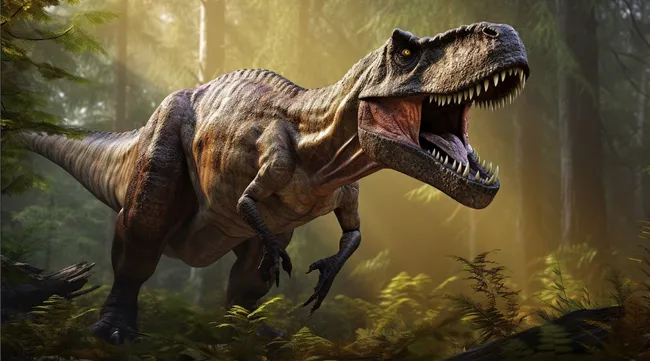A new study challenges recent claims that dinosaurs, particularly Tyrannosaurus rex, had intelligence comparable to primates, suggesting instead that their cognitive abilities were more akin to those of modern-day crocodiles.
For decades, most scientists have agreed that the intelligence of T. rex was similar to that of modern reptiles. This consensus was shaken in 2023 when a Brazilian neuroscientist posited that T. rex had cognitive capabilities closer to primates, raising the provocative question: Could T. rex have been as smart as a baboon, or even a human?
A recent study published in The Anatomical Record reaffirms the traditional view. An international team of scientists concluded that T. rex intelligence was likely similar to that of a crocodile. “This traditional view is likely the right one,” said Kai Caspar, a zoologist at Heinrich Heine University Düsseldorf in Germany, who led the study. Caspar, an expert in cognitive evolution, explained that the team used endocasts—molds of fossil skulls—to estimate brain size and tissue proportions. While not perfect, this method is the best available for studying the brain biology of long-extinct animals.
In modern reptiles like alligators and crocodiles, the brain occupies about 30% of the cranial cavity, compared to nearly 100% in birds and mammals. Caspar noted that the 2023 study likely overestimated T. rex brain size by assuming it filled the entire cranial cavity, akin to modern birds. Furthermore, the Brazilian study included data inconsistencies by mixing juvenile and adult T. rex samples and incorporating non-brain structures like the olfactory bulb into brain size estimates.
Caspar and his colleagues addressed these issues by standardizing body mass estimates and excluding non-neural structures from their analysis. Their revised estimates placed the number of neurons in the T. rex brain between 250 million and 1.7 billion, similar to modern crocodiles. In contrast, the Brazilian study estimated 3.3 billion neurons, comparable to baboons.
Despite these findings, Caspar emphasized that neuron count and brain size are not definitive predictors of intelligence. Animal cognition varies widely and is not solely dependent on these factors. For example, pigeons have small brains with high neuron density and can perform tasks comparable to those of monkeys with larger brains.
“Neuron counts have not proven themselves to be very good predictors of intelligence in modern animals. So why should we assume that they are for extinct ones?” Caspar said. He advised against viewing the findings as a downgrade from primate-level intelligence, noting that understanding T. rex brain biology can offer insights into modern reptilian behavior.
“To say that dinosaurs resembled living reptiles in their cognition doesn’t mean that they were boring animals,” Caspar concluded. “Reptiles can be fascinating as well.”
